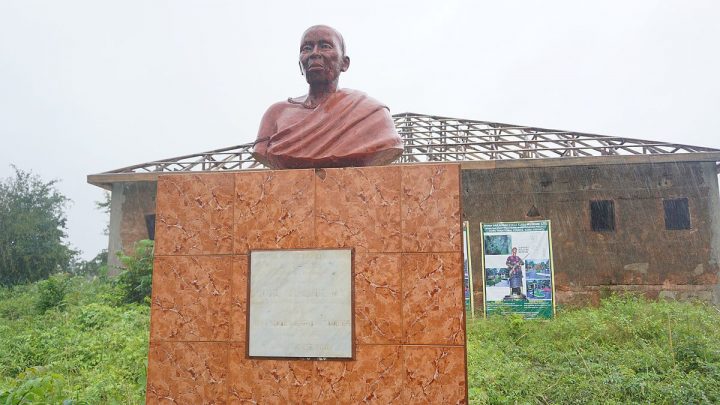Yaa Asantewa was born in 1840 in Besease, a city in what is now Ghana. She was the sister of Yaya Kwasi, who granted her the title of queen mother of Ejisuhene, a part of the Ashanti empire; given that there was a matriarchal system in place, this made her the most powerful person in the kingdom.
During her brother’s reign, Asantewa saw at first hand the rise of British expansionism; when her brother died in 1894, she used her right as queen mother to nominate her grandson as the chief of the Ashanti. Following his exile to the Seychelles in 1896 by the British, along with King Prempeh I and other members of the government, Yaa Asantewa became regent of the Ejisu–Juaben district.
Frederick Hodgson, the governor-general of the area that the British called the Gold Coast, had heard references to the Golden Stool, a sacred dynastic symbol of the Ashanti and demanded that it be bought to him. For the Ashanti, however, death was preferable to surrendering the Golden Stool.
Hodgson’s demand led to a secret meeting in the city of Kumasi of the remaining members of the government. Yaa Asantewa, who was the only woman present, stood up and made a speech that was to become famous: “I see that some of you fear putting yourselves forward to fight for our king. If these were the brave days of Osei Tutu, Okomfo Anokye and Opuku Ware, chiefs would not look on while their king was taken away. No white man has ever dared speak to the chief of the Ashanti as the governor did this morning. Can it be true therefore that the bravery of the Ashanti is no more? I will not believe it, and so I say to you: if you, the men of Ashanti, will not fight, then we women will. We will fight the white men. We will fight until every last one of us falls on the battlefield.”
Yaa Asantewa was chosen to lead the Ashanti army in what became known as the war of the Golden Stool and succeeded in driving the British from Kumasi. The rebellion lasted several months and was the last in a series of wars that had lasted throughout the 19th century. The British finally succeeded in capturing Yaa Asantewa and sent her to the Seychelles in exile.
On 1 January 1902 the British achieved what the Ashanti had denied them for almost a century and the empire became a protectorate of the British Crown.
Yaa Asantewa died in exile on 17 October 1921. Three years later, on 27 December 1924, Prempah I and the other remaining members of the Ashanti court were allowed to return. They brought with them the remains of Yaa Asantewa and she was given a royal burial worthy of her name. Her dream of liberation from British rule was realised on 6 March 1957, when the protectorate gained independence as part of Ghana, the first nation in sub-Saharan Africa to win independence.
Yaa Asantewa is considered one of the most important figures in Africa’s fight for freedom and is the national heroine of Ghana. In 2000, week-long events in the country were held to celebrate her feats, and a museum, partially destroyed in a fire in 2004, was dedicated to her in Ejisu.
Translation from Italian by Malcolm Gilmour










